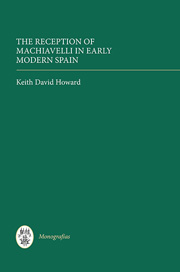Book contents
- Frontmatter
- Dedication
- Contents
- Acknowledgements
- Introduction
- 1 Medieval and Renaissance Humanist Political Discourse and Machiavelli
- 2 Machiavelli and Spanish Imperialist Discourse in the Sixteenth Century
- 3 Machiavelli and the Foundations of the Spanish Reason-of-State Tradition: Giovanni Botero and Pedro de Ribadeneyra
- 4 Machiavellian Discourse in the Hispanic Baroque Reason-of-State Tradition
- 5 Juan Pablo Mártir Rizo's Rereading of the Prince
- Conclusion
- Bibliography
- Index
Introduction
Published online by Cambridge University Press: 05 September 2014
- Frontmatter
- Dedication
- Contents
- Acknowledgements
- Introduction
- 1 Medieval and Renaissance Humanist Political Discourse and Machiavelli
- 2 Machiavelli and Spanish Imperialist Discourse in the Sixteenth Century
- 3 Machiavelli and the Foundations of the Spanish Reason-of-State Tradition: Giovanni Botero and Pedro de Ribadeneyra
- 4 Machiavellian Discourse in the Hispanic Baroque Reason-of-State Tradition
- 5 Juan Pablo Mártir Rizo's Rereading of the Prince
- Conclusion
- Bibliography
- Index
Summary
In 1637, Claudio Clemente published his Machiavelismo degollado por la Christiana Sabiduria de España y Austria in Alcalà de Henares. In it, after a brief introduction to the “Politicos,” whom he characterizes as members of a religious sect, Clemente takes his readers on an imaginary expedition in which he infiltrates their temple and witnesses an induction ceremony for a young noble. It is worthwhile to recount this narration, because its overtly fictitious nature illustrates very well to what extent the anti-Machiavellians of the reason-of-state tradition had been utilizing an invented characterization (or, in this case, a caricature) of Machiavelli and a group of his supposed devotees for rhetorical ends.
He begins by explaining that it was difficult to enter the temples of the “Idolatras de la Policia”: “porque ninguno puede alcançar los negocios que alli se tratan, las palabras que se dizen, los mysterios que se celebran, si no es que en primer lugar se aya el tambien consagrado por Sacerdote de los mismos mysterios, y jurado aquel tan sagrado y inuiolable juramento.”
This insistence on the secrecy, of the “mystery,” of the políticos' rites and knowledge brings new dramatic life to the tradition of arcana imperii. Clemente declares his intention was to expose the politìcos for what they were: “para que auiendo descubierto sus secretos, vengan todos en aborrecimiento deste contagio mortal del comercio y trato de vnos hombres con otros.”
- Type
- Chapter
- Information
- The Reception of Machiavelli in Early Modern Spain , pp. 1 - 12Publisher: Boydell & BrewerPrint publication year: 2014



